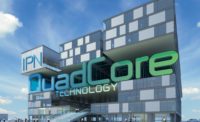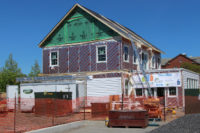Award-Winning Project FROG Chooses K-tect's Insulated Wall Panels to Achieve Zero-Net-Energy Buildings
Project FROG has chosen K-tect Sustainable Building Systems insulated wall panels for
its zero-net-energy (ZNE) capable building system. ZNE buildings achieve
zero-net-energy consumption and zero carbon emissions annually.

LAS VEGAS - Project FROG has chosen K-tect Sustainable Building Systems insulated wall panels for its zero-net-energy (ZNE) capable building system. ZNE buildings achieve zero-net-energy consumption and zero carbon emissions annually.
Companies using Project Frog's system will realize savings on utility bills, produce safer indoor air environments and complete construction quicker. In the long term, the environment will benefit from these eco-friendly structures, which reduce reliance on fossil fuels.
K-tect panels are the newest generation of structural insulated panels. They are not “sandwiched” and feature light-gauge metal stud framing that integrates insulation and soundproofing to produce thermal efficiency and noise control without the need for extra materials. They also resist natural disasters, mold, mildew, moisture, insects, fire, rust and warping as well as feature fully non-toxic composition.
“K-tect helps us deliver aggressive energy performance and schedule requirements,” said Ash Notaney, vice president of Project FROG's supply chain. “K-tect's thermally broken, code-compliant wall panels directly align with our value proposition of 'Better, Greener, Faster, Cheaper.’”
K-tect Sustainable Building Systems panels, which meet or exceed all green building standards, have been applied to numerous other projects, including the world's first LEED registered “green” moveable floating structure, Utah's first LEED Gold Certified medical building, the first “green” tribal reservation housing project and HUD's first “green” affordable housing project with Architecture for Charity.
“Our company mission at K-tect dovetails with that of Project FROG,” said K-tect Owner/Director Ken Miller. “Both companies know that being environmentally friendly and cost-effective are not mutually exclusive. ‘Going green’ is no longer a trend but a new standard. We see a bright future for our materials that help construction projects realize harmonic balance between environment and budget.”
For more information, visit www.projectfrog.com.

Zero-net energy Community
Center at Hunter's Point in San Francisco, Calif., built with K-tect.
LAS VEGAS - Project FROG has chosen K-tect Sustainable Building Systems insulated wall panels for its zero-net-energy (ZNE) capable building system. ZNE buildings achieve zero-net-energy consumption and zero carbon emissions annually.
Companies using Project Frog's system will realize savings on utility bills, produce safer indoor air environments and complete construction quicker. In the long term, the environment will benefit from these eco-friendly structures, which reduce reliance on fossil fuels.
K-tect panels are the newest generation of structural insulated panels. They are not “sandwiched” and feature light-gauge metal stud framing that integrates insulation and soundproofing to produce thermal efficiency and noise control without the need for extra materials. They also resist natural disasters, mold, mildew, moisture, insects, fire, rust and warping as well as feature fully non-toxic composition.
“K-tect helps us deliver aggressive energy performance and schedule requirements,” said Ash Notaney, vice president of Project FROG's supply chain. “K-tect's thermally broken, code-compliant wall panels directly align with our value proposition of 'Better, Greener, Faster, Cheaper.’”
K-tect Sustainable Building Systems panels, which meet or exceed all green building standards, have been applied to numerous other projects, including the world's first LEED registered “green” moveable floating structure, Utah's first LEED Gold Certified medical building, the first “green” tribal reservation housing project and HUD's first “green” affordable housing project with Architecture for Charity.
“Our company mission at K-tect dovetails with that of Project FROG,” said K-tect Owner/Director Ken Miller. “Both companies know that being environmentally friendly and cost-effective are not mutually exclusive. ‘Going green’ is no longer a trend but a new standard. We see a bright future for our materials that help construction projects realize harmonic balance between environment and budget.”
For more information, visit www.projectfrog.com.
Looking for a reprint of this article?
From high-res PDFs to custom plaques, order your copy today!





